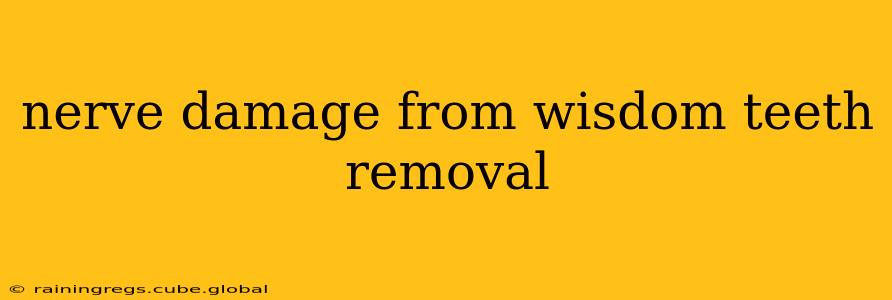Wisdom teeth removal is a common procedure, but like any surgery, it carries potential risks. One of the most concerning complications is nerve damage. This comprehensive guide explores the causes, symptoms, and treatment options for nerve damage following wisdom teeth extraction. We'll also address frequently asked questions surrounding this potential complication.
What Causes Nerve Damage During Wisdom Teeth Removal?
Nerve damage after wisdom teeth removal is usually caused by the proximity of the inferior alveolar nerve (IAN) to the lower wisdom teeth. This nerve runs along the lower jaw and controls sensation in the lower lip, chin, and teeth. During the extraction process, if the nerve is accidentally injured or stretched, it can lead to various degrees of nerve damage. The risk is higher with impacted wisdom teeth, those that are difficult to remove due to their position or angulation within the jawbone. Factors like the surgeon's skill and experience also play a significant role in minimizing this risk. Experienced oral surgeons are trained to identify and carefully navigate around the IAN to prevent injury.
What are the Symptoms of Nerve Damage After Wisdom Teeth Removal?
Symptoms of nerve damage can vary depending on the severity of the injury. They can range from mild tingling or numbness to complete loss of sensation. Here's a breakdown:
- Numbness: A loss of feeling in the lower lip, chin, or teeth on the side of the extraction.
- Tingling: A pins-and-needles sensation in the affected area.
- Pain: Sharp, shooting pains, or burning sensations.
- Weakness: Difficulty controlling the muscles in the lower lip or chin.
- Altered Taste: Changes in taste perception.
How Common is Nerve Damage After Wisdom Teeth Removal?
The incidence of nerve damage following wisdom teeth extraction is relatively low, but it's a crucial complication to understand. The exact percentage varies based on several factors, including the complexity of the extraction and the surgeon's experience. While statistics can fluctuate, it's generally considered a rare but serious potential consequence.
How is Nerve Damage from Wisdom Teeth Removal Diagnosed?
Your oral surgeon will typically diagnose nerve damage through a thorough examination, including a careful assessment of sensation in the lower lip, chin, and jaw. They may also use diagnostic tools to confirm the diagnosis and determine the extent of the injury. In some cases, further imaging may be necessary.
What is the Treatment for Nerve Damage After Wisdom Teeth Removal?
Treatment for nerve damage depends on the severity and type of injury. In many cases, the damage is temporary and resolves spontaneously over time. However, if the symptoms persist, various treatment options might be considered:
- Medication: Pain relievers and anti-inflammatory drugs can help manage pain and inflammation.
- Physical Therapy: This can help improve nerve function and promote healing.
- Surgical Intervention: In rare cases, surgery may be needed to repair the damaged nerve.
How Long Does Nerve Damage After Wisdom Teeth Removal Last?
The recovery time for nerve damage varies greatly. In many cases, numbness or tingling resolves within a few weeks or months. However, in more severe cases, recovery can take much longer, even several years in some instances. Regular follow-up appointments with your oral surgeon are essential for monitoring your progress.
Can Nerve Damage from Wisdom Teeth Removal Be Prevented?
While it cannot be entirely prevented, the risk of nerve damage can be significantly reduced by choosing an experienced and skilled oral surgeon. A thorough pre-operative assessment, including imaging, helps identify potential risks and allows the surgeon to plan the procedure accordingly.
What Should I Do if I Suspect Nerve Damage After Wisdom Teeth Removal?
If you experience any numbness, tingling, pain, or weakness in your lower lip, chin, or teeth after wisdom teeth removal, contact your oral surgeon immediately. Early diagnosis and intervention are crucial for maximizing the chances of a successful recovery. Don't hesitate to seek medical attention.
This information is for general knowledge and does not constitute medical advice. Always consult with your oral surgeon or dentist for any concerns regarding your oral health.
